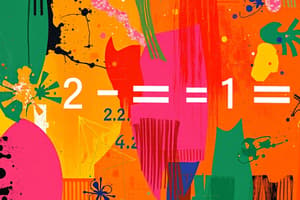Podcast
Questions and Answers
What is the additive identity for real numbers?
What is the additive identity for real numbers?
- 0 (correct)
- -1
- 1
- Any real number
What is the multiplicative inverse of a real number 'a'?
What is the multiplicative inverse of a real number 'a'?
- 1/a (correct)
- -a
- a
- 2a
What is the result of a + (-a) for any real number 'a'?
What is the result of a + (-a) for any real number 'a'?
- a
- 1
- 0 (correct)
- -a
Which property ensures that for any two real numbers a and b, ab is also a real number?
Which property ensures that for any two real numbers a and b, ab is also a real number?
What is the distributive law of multiplication over addition?
What is the distributive law of multiplication over addition?
What is the additive inverse of 3?
What is the additive inverse of 3?
What is the multiplicative identity for real numbers?
What is the multiplicative identity for real numbers?
What property ensures that between any two real numbers, there exist infinitely many real numbers?
What property ensures that between any two real numbers, there exist infinitely many real numbers?
What is true about the rational number if both numerator and denominator are either both positive or both negative?
What is true about the rational number if both numerator and denominator are either both positive or both negative?
Which of the following is a false statement?
Which of the following is a false statement?
What type of number is the quotient of two integers?
What type of number is the quotient of two integers?
Where are the rational numbers 1 and -1 located on the number line?
Where are the rational numbers 1 and -1 located on the number line?
What is the correct statement about rational numbers?
What is the correct statement about rational numbers?
Which of the following is true about fractions and rational numbers?
Which of the following is true about fractions and rational numbers?
What is the additive inverse of 4³/5?
What is the additive inverse of 4³/5?
What is the additive inverse of a rational number?
What is the additive inverse of a rational number?
How can you order rational numbers on the number line?
How can you order rational numbers on the number line?
Which of the following rational numbers is smallest?
Which of the following rational numbers is smallest?
What is the sum of 15/15 and 1/5?
What is the sum of 15/15 and 1/5?
Which property of rational numbers states that the sum of two rational numbers is always a rational number?
Which property of rational numbers states that the sum of two rational numbers is always a rational number?
What is the additive identity of 2009?
What is the additive identity of 2009?
If p + q = 3f + 6, then what is the value of p + q?
If p + q = 3f + 6, then what is the value of p + q?
What is the equivalent rational number of 3/4?
What is the equivalent rational number of 3/4?
Which property of rational numbers states that the order of the numbers being added does not change the result?
Which property of rational numbers states that the order of the numbers being added does not change the result?
Flashcards are hidden until you start studying
Study Notes
Properties of Real Numbers
- Additive identity: 0 is a real number such that 0 + a = a for every real number 'a'
- Additive inverse: For each real number 'a', there exists a real number (-a) such that a + (-a) = 0
- Additive inverse of a number 'a' is denoted by (-a)
- Closure property: The sum of two real numbers is always a real number
- Associative property: (a + b) + c = a + (b + c) for all real numbers a, b, c
- Commutative property: a + b = b + a for all real numbers a and b
Properties of Multiplication
- Closure property: The product of two real numbers is always a real number
- Associative property: (ab) c = a(bc) for all real numbers a, b, c
- Commutative property: ab = ba for all real numbers a and b
- Multiplicative identity: 1 is a real number such that 1.a = a for every real number 'a'
- Multiplicative inverse: For each non-zero real number 'a', there exists a real number 1/a such that a × 1/a = 1
Properties of Rational Numbers
- The sum of two rational numbers is always a rational number
- The product of two rational numbers is always a rational number
- Every fraction is a rational number, but every rational number need not be a fraction
- Every integer is a rational number, but every rational number need not be an integer
Rational Numbers and Fractions
- If the numerator and denominator are both positive or both negative, then the number is a positive rational number
- A rational number can be expressed as a fraction, but a fraction may not be a rational number
- The quotient of two integers is always a rational number, except when the denominator is 0
Number Line
- Every real number can be represented by a unique point on the number line
- Every point on the number line corresponds to a unique real number
- The rational number 1 and -1 are on opposite sides of 0 on the number line
Studying That Suits You
Use AI to generate personalized quizzes and flashcards to suit your learning preferences.



